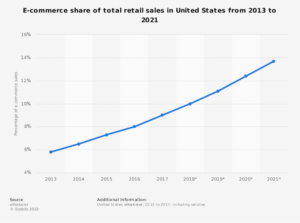The retail sector in the UK generates nearly £400bn of revenue each year, according to the ONS. The rising ratio of Internet sales as a percentage of total retail sales is increasing steadily, and with technological advances, it’s unlikely to slow down anytime soon.

Here we look at the continuing technology trends for the retail sector and where you should keep an eye on as we move towards 2019.
 Checkouts will be streamlined
Checkouts will be streamlined
The IoT (Internet of Things) will be invested into by major retailers globally as they look to achieve the goal of a “one-click checkout”. As you will have seen from the line-less, cashier-less Amazon Go stores – using deep-learning, sensors and IoT will mean a smoother and stress-free exit for shoppers. Amazon want to open a whopping 3000 stores in the US alone by 2021. This will spur on other competition and keep technology moving forwards, as digital cameras and facial recognition will be a focal point of the demand for quicker checkouts.
 Artificial Intelligence will be everywhere
Artificial Intelligence will be everywhere
AI has taken off over the last couple of years, with the introduction of Chatbots seemingly trying to engage with us everywhere – not only on e-commerce sites but also across social media. 55% of retailers plan to utilise AI to improve customer service within the next 3 years, which will lead to stronger brand loyalty and increased sales. AI will also work together with IoT and personalisation to generate increased profits for any retailer who will invest in the right technology.
Artificial Intelligence is not only for online retailers, but in-store to. Voice assistants such as Alexa will be the future many retailers as we embrace a totally connected shopping experience.
 Personalisation is key
Personalisation is key
Personalisation will continue to its rise as it creates a custom shopping experience for each customer. Online shoppers want brand interactions that are tailored to their own needs. Personalisation engines can use research and insights to identify personalisation solutions for brands and consumers.
Gartner created their first Magic Quadrant this year in 2018, as they investigated vendors in the Personalisation Engine sector. Out on top came Dynamic Yield, however not far behind them was Evergage, Certona and Monetate. Understandably, there are 20+ tech vendors in this space all looking to dominate the personalisation market.
 Staying secure is tough
Staying secure is tough
As it becomes easier to make purchases, with more devices connecting data that is stored on consumers – along comes the risk of keeping important information secure. Malware is found in many places, including on government payment sites in 2018, with many data breaches being reported on a weekly basis.
Hacking into servers to get consumer data is part of a giant data issue, but it affects the retail market is an enormous way.
 The High Street future is still unknown
The High Street future is still unknown
All of the above will mean that High Street stores will continue to close. These aren’t replaced with new stores either, for about every 3 stores that close, only 2 open.
Even though you might have been able to bag a discount at any closing down store at Toys ‘R’ Us, harsh reality is that the High Street will continue to change as the likes of Homebase and Mothercare all consider closing down dozens of stores.
We’d love to know where you think the future of retail is heading – please contact me below or reach out to me on jamesh@alexjamesresourcing.co.uk
James Haffner
Director of Alex James Digital

